高中英语外研版必修3 Module 2 Developing and Developed Countries Grammar---主谓一致 课件 (共24张)
文档属性
| 名称 | 高中英语外研版必修3 Module 2 Developing and Developed Countries Grammar---主谓一致 课件 (共24张) | 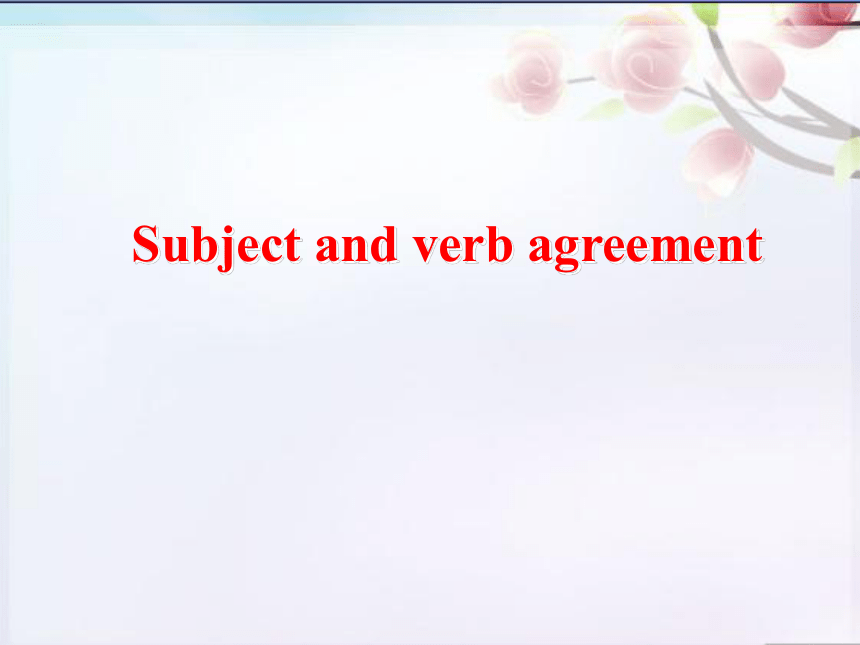 | |
| 格式 | zip | ||
| 文件大小 | 231.1KB | ||
| 资源类型 | 教案 | ||
| 版本资源 | 外研版 | ||
| 科目 | 英语 | ||
| 更新时间 | 2019-03-06 16:58:19 | ||
图片预览

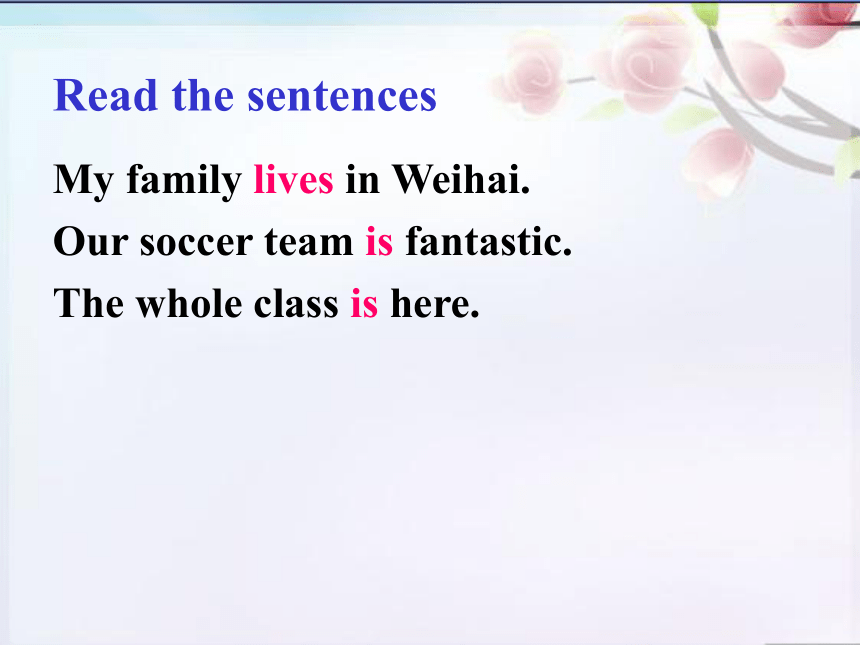
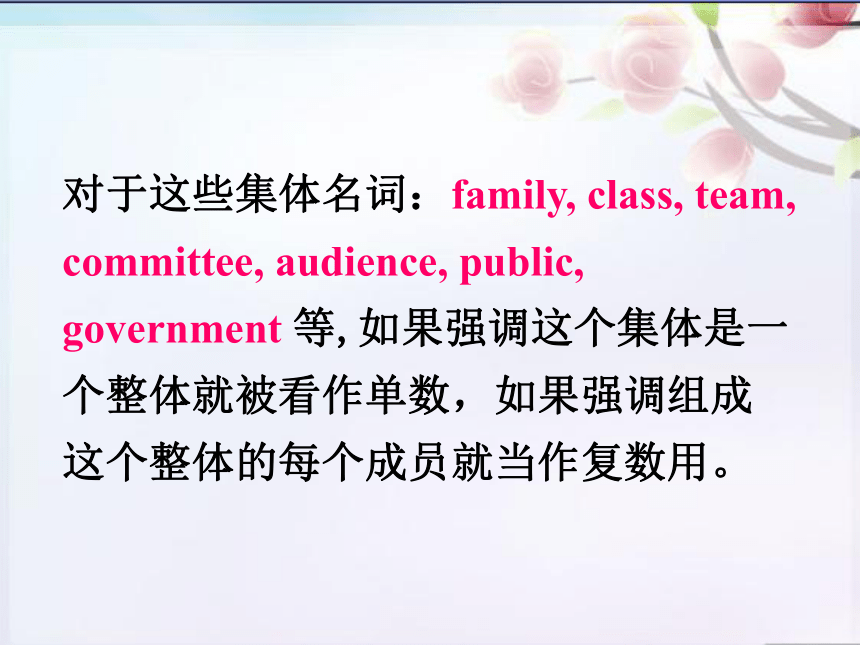
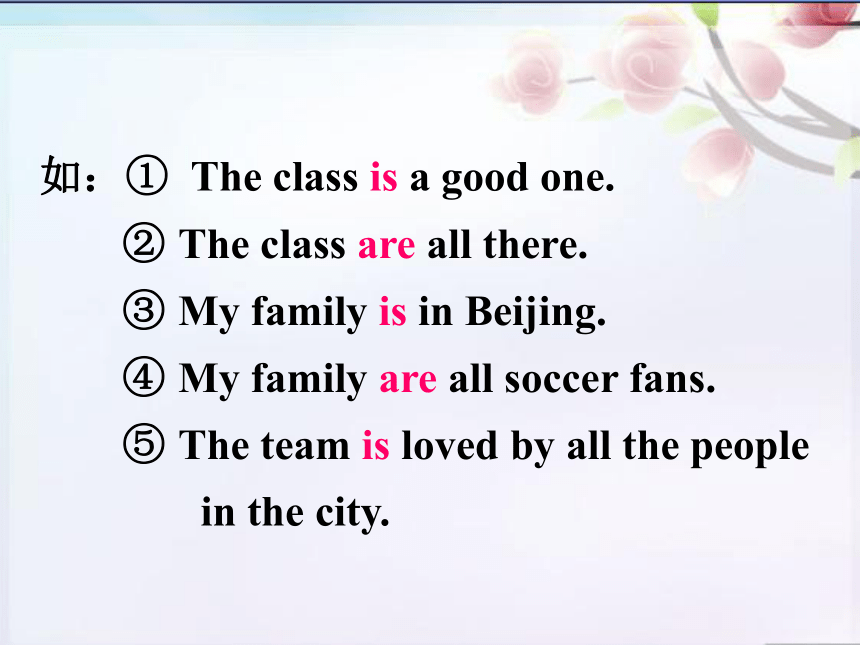

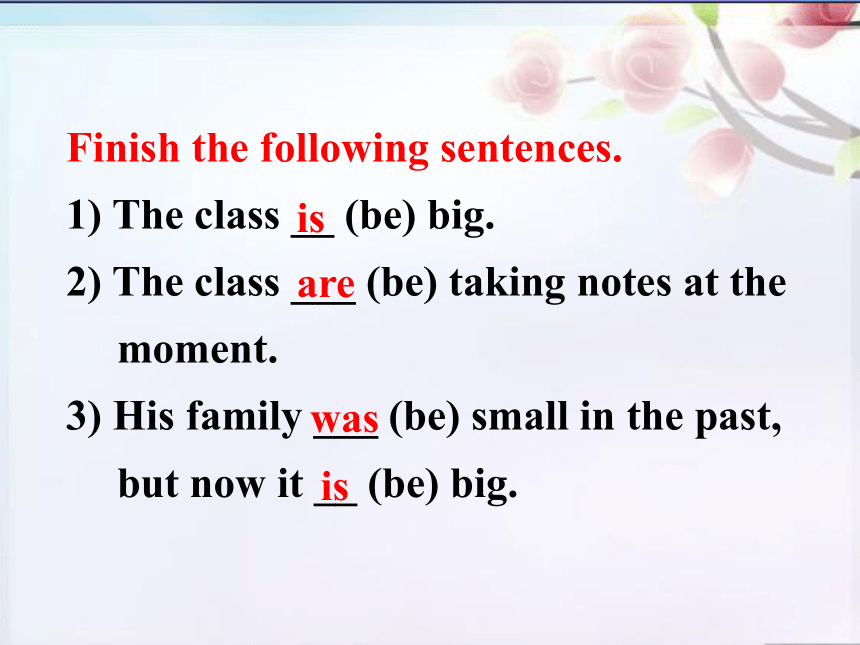
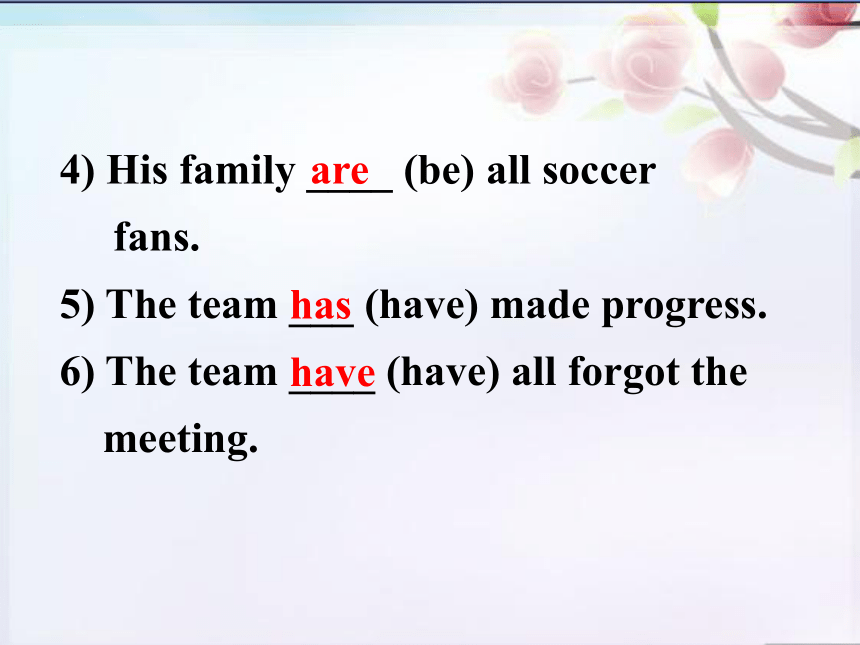
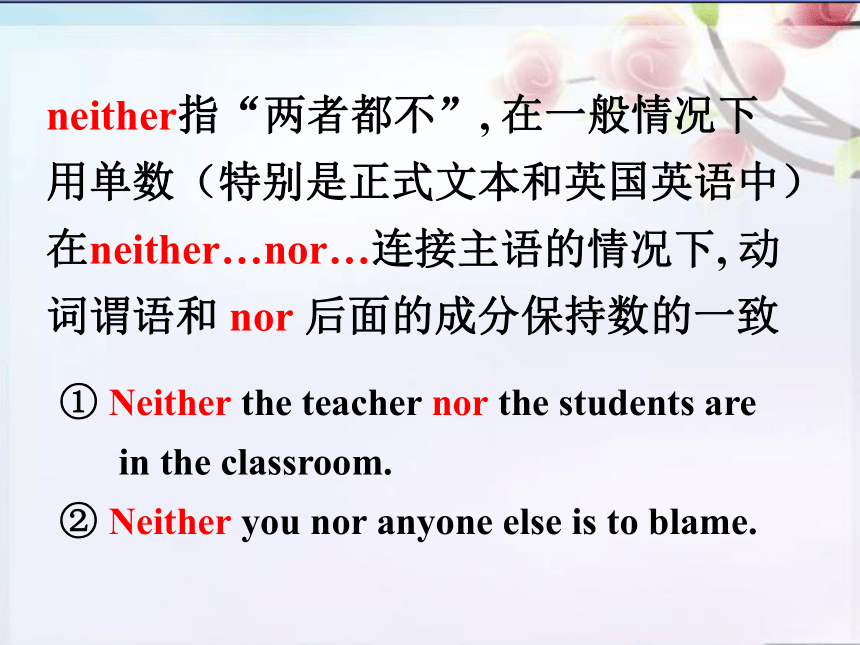
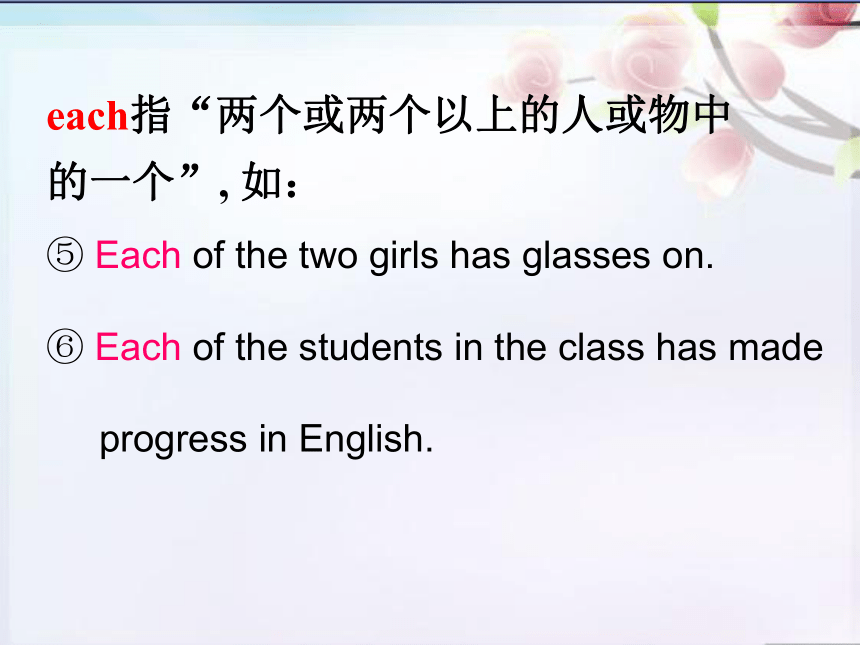
文档简介
课件24张PPT。Subject and verb agreementRead the sentences My family lives in Weihai.
Our soccer team is fantastic.
The whole class is here. 对于这些集体名词:family, class, team,
committee, audience, public, government 等,如果强调这个集体是一个整体就被看作单数,如果强调组成这个整体的每个成员就当作复数用。如:① The class is a good one.
② The class are all there.
③ My family is in Beijing.
④ My family are all soccer fans.
⑤ The team is loved by all the people in the city. ⑥ The team have now known the whole story.
⑦ The audience was large.
⑧ The audience are now enjoying the play so much.Finish the following sentences.
1) The class __ (be) big.
2) The class ___ (be) taking notes at the moment.
3) His family ___ (be) small in the past, but now it __ (be) big.is are was is 4) His family ____ (be) all soccer
fans.
5) The team ___ (have) made progress.
6) The team ____ (have) all forgot the meeting.are has have neither指“两者都不”, 在一般情况下用单数(特别是正式文本和英国英语中)在neither…nor…连接主语的情况下, 动词谓语和 nor 后面的成分保持数的一致① Neither the teacher nor the students are in the classroom.
② Neither you nor anyone else is to blame.each指“两个或两个以上的人或物中的一个”, 如:⑤ Each of the two girls has glasses on.
⑥ Each of the students in the class has made
progress in English. ③ None of the stories is believable.
④ None of the emails have been answered.
none 表示“否定”, 既能指人又能指物,
多用单数, 也可用作复数;1) None __ (be) willing to miss her lecture.
2) None of them ___ (have) a camera.
3) Each of the boys ___ (have)a room to himself.
4) Neither of the examples _______
(explain) it well.
5) Neither the students nor their teacher
__ (be)here. is/are has/have has explains is 6)?Neither the teacher nor their students
__ (be) here. are 主谓一致的拓展讲解英语中,句子的主语和谓语在人称与数
上应保持一致,即主谓一致。
1. and连接两个并列主语时,谓语动词一般用复数形式。若and连接的两部分指同一人、同一物、同一事或同一概念时,谓语动词则常用单数形式;
a. The teacher and writer is respected
by all the people.
b. The teacher and the writer are
respected by all the people.2. 意义一致原则,即谓语动词形式取决于
主语的意义;
a. Physics is a difficult subject.
b. The young couple are always
quarreling with each other over
money.3. 就近一致原则,它是指or, either ... or,
neither ... nor, not only ... but also,
not ...but等连接并列主语时,谓语动.
词常和最靠近它的主语保持一致;
a. Either you or I am wrong.
b. Not only his friends, but also he
himself is looking forward to the
meeting.4. 主语后有“with, along with, together
with, including, but, except, like, as
well as, besides, rather than + 名词”
等作修饰语时,谓语动词仍和前面的
主语保持一致;
a. Ann with her son and her daughter
was in New York in 2004.
b. You, rather than your sister, are to
be invited to the party.5. 单个的不定式、动词-ing形式或主语从
句作主语时,谓语动词用单数;
a. Playing basketball is good for your
health.
b. That our teacher is going to leave us
makes us disappointed.
6. 不定代词作主语,谓语动词通常用单
数;
a. Someone is calling you on the phone.
b. Nothing is too difficult if you put your
heart into it.7. 在定语从句中,关系代词作主语,其
谓语动词应与它所指代的先行词保持
一致;
a. Those who are against the plan can
leave.
b. Anyone who is interested in the plan
can go with us.
8. 在倒装句中,谓语动词与其后面的主
语保持一致;a. Between the two countries lie five big
lakes.
b. At the foot of the hill is a primary
school.
9. “half, all, some, most, part, the rest,
lots, plenty, 分数,百分数 + of + 名
词”等作主语时,谓语动词要和of 之
后的名词单复数保持一致; a. Nearly 80% of the university
students have part-time jobs.
b. Two thirds of the work hasn’t been
finished yet.
10. 表示时间、距离、金钱、重量的复
数名词表示单位数量用作主语时,
通常看作整体,谓语动词用单数。
a. Three thousand kilometers is a
long distance.
b. Two months is long enough for us
to solve the problem.课后练习用括号内所给动词的适当形式填空。
1. This is one of the best novels that
_____________ (appear) this year.
2. The homeless _____ (be) well looked
after by the government after the
earthquake.
3. Not only the students but also I _____
(be) fond of watching sports games.wereamhave appeared4. I have read a large part of the book;
the rest _____ (be) more difficult.
5. The students in his class each _____
(have) an English-English dictionary.
6. Between the two lines of trees _____
(be) our newly- built teaching building.
7. No one except high officials of the
country _____ (know) anything about
the accident now.isishaveknows8. The number of people invited _____
(be) forty. However, a number of
people _____ (be) absent for different
reasons.
9. All that can be done _____ (have) been
done.
10. All present at the meeting ____ (be)
in favor of my idea.isarehasare11. The whole class _____ (be) listening to
the teacher carefully.
12. We are surprised to find that every
man and every woman _____ (be) at
work.areis
Our soccer team is fantastic.
The whole class is here. 对于这些集体名词:family, class, team,
committee, audience, public, government 等,如果强调这个集体是一个整体就被看作单数,如果强调组成这个整体的每个成员就当作复数用。如:① The class is a good one.
② The class are all there.
③ My family is in Beijing.
④ My family are all soccer fans.
⑤ The team is loved by all the people in the city. ⑥ The team have now known the whole story.
⑦ The audience was large.
⑧ The audience are now enjoying the play so much.Finish the following sentences.
1) The class __ (be) big.
2) The class ___ (be) taking notes at the moment.
3) His family ___ (be) small in the past, but now it __ (be) big.is are was is 4) His family ____ (be) all soccer
fans.
5) The team ___ (have) made progress.
6) The team ____ (have) all forgot the meeting.are has have neither指“两者都不”, 在一般情况下用单数(特别是正式文本和英国英语中)在neither…nor…连接主语的情况下, 动词谓语和 nor 后面的成分保持数的一致① Neither the teacher nor the students are in the classroom.
② Neither you nor anyone else is to blame.each指“两个或两个以上的人或物中的一个”, 如:⑤ Each of the two girls has glasses on.
⑥ Each of the students in the class has made
progress in English. ③ None of the stories is believable.
④ None of the emails have been answered.
none 表示“否定”, 既能指人又能指物,
多用单数, 也可用作复数;1) None __ (be) willing to miss her lecture.
2) None of them ___ (have) a camera.
3) Each of the boys ___ (have)a room to himself.
4) Neither of the examples _______
(explain) it well.
5) Neither the students nor their teacher
__ (be)here. is/are has/have has explains is 6)?Neither the teacher nor their students
__ (be) here. are 主谓一致的拓展讲解英语中,句子的主语和谓语在人称与数
上应保持一致,即主谓一致。
1. and连接两个并列主语时,谓语动词一般用复数形式。若and连接的两部分指同一人、同一物、同一事或同一概念时,谓语动词则常用单数形式;
a. The teacher and writer is respected
by all the people.
b. The teacher and the writer are
respected by all the people.2. 意义一致原则,即谓语动词形式取决于
主语的意义;
a. Physics is a difficult subject.
b. The young couple are always
quarreling with each other over
money.3. 就近一致原则,它是指or, either ... or,
neither ... nor, not only ... but also,
not ...but等连接并列主语时,谓语动.
词常和最靠近它的主语保持一致;
a. Either you or I am wrong.
b. Not only his friends, but also he
himself is looking forward to the
meeting.4. 主语后有“with, along with, together
with, including, but, except, like, as
well as, besides, rather than + 名词”
等作修饰语时,谓语动词仍和前面的
主语保持一致;
a. Ann with her son and her daughter
was in New York in 2004.
b. You, rather than your sister, are to
be invited to the party.5. 单个的不定式、动词-ing形式或主语从
句作主语时,谓语动词用单数;
a. Playing basketball is good for your
health.
b. That our teacher is going to leave us
makes us disappointed.
6. 不定代词作主语,谓语动词通常用单
数;
a. Someone is calling you on the phone.
b. Nothing is too difficult if you put your
heart into it.7. 在定语从句中,关系代词作主语,其
谓语动词应与它所指代的先行词保持
一致;
a. Those who are against the plan can
leave.
b. Anyone who is interested in the plan
can go with us.
8. 在倒装句中,谓语动词与其后面的主
语保持一致;a. Between the two countries lie five big
lakes.
b. At the foot of the hill is a primary
school.
9. “half, all, some, most, part, the rest,
lots, plenty, 分数,百分数 + of + 名
词”等作主语时,谓语动词要和of 之
后的名词单复数保持一致; a. Nearly 80% of the university
students have part-time jobs.
b. Two thirds of the work hasn’t been
finished yet.
10. 表示时间、距离、金钱、重量的复
数名词表示单位数量用作主语时,
通常看作整体,谓语动词用单数。
a. Three thousand kilometers is a
long distance.
b. Two months is long enough for us
to solve the problem.课后练习用括号内所给动词的适当形式填空。
1. This is one of the best novels that
_____________ (appear) this year.
2. The homeless _____ (be) well looked
after by the government after the
earthquake.
3. Not only the students but also I _____
(be) fond of watching sports games.wereamhave appeared4. I have read a large part of the book;
the rest _____ (be) more difficult.
5. The students in his class each _____
(have) an English-English dictionary.
6. Between the two lines of trees _____
(be) our newly- built teaching building.
7. No one except high officials of the
country _____ (know) anything about
the accident now.isishaveknows8. The number of people invited _____
(be) forty. However, a number of
people _____ (be) absent for different
reasons.
9. All that can be done _____ (have) been
done.
10. All present at the meeting ____ (be)
in favor of my idea.isarehasare11. The whole class _____ (be) listening to
the teacher carefully.
12. We are surprised to find that every
man and every woman _____ (be) at
work.areis
